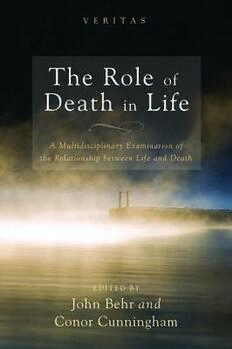
The Role of Death in Life: A Multidisciplinary Examination of the Relationship between Life and Death PDF
Preview The Role of Death in Life: A Multidisciplinary Examination of the Relationship between Life and Death
The Role of Death in Life A Multidisciplinary Examination of the Relationship between Life and Death Edited by John Behr Conor Cunningham C The Role of Death in Life James Clarke & Co and The Lutterworth Press Click on the links above to see our full catalogue for more excellent titles in Hardback, Paperback, PDF and Epub! The Role of Death in Life ISBN: 9780227905302 C L Would you like to join our Mailing List? Click here! The Role of Death in Life A Multidisciplinary Examination of the Relationship between Life and Death Edited by John Behr and Conor Cunningham C James Clarke & Co For Mary Ann Meyers, in whom there is Life in abundance James Clarke & Co P.O. Box 60 Cambridge CB1 2NT United Kingdom www.jamesclarke.co [email protected] ISBN: 978 0 227 17572 9 British Library Cataloguing in Publication Data A record is available from the British Library First published by James Clarke & Co, 2016 Copyright © Wipf and Stock Publishers, 2015 Published by arrangement with Cascade Books All rights reserved. No part of this edition may be reproduced, stored electronically or in any retrieval system, or transmitted in any form or by any means, electronic, mechanical, photocopying, recording, or otherwise, without prior written permission from the Publisher ([email protected]). Table of Contents List of Contributors vii Preface ix I: Perspectives from Astronomy, Chemistry, and Biology 1: Made of Star-stuff: The Origin of the Chemical Elements in Life 3 —Alexei V. Filippenko 2: A Biochemical Perspective on the Origin of Life and Death 14 —Luc Jaeger II: Perspective from Anthropology 3: Immortality 31 —Douglas Davies III: Perspectives from Philosophy 4: Suffering Death 45 —Emmanuel Falque 5: How Do We Become Fully Alive? The Role of Death in Henry’s Phenom- enology of Life 56 —Christina Gschwandtner IV: Perspectives from Theology 6: Life and Death in the Age of Martyrdom 79 —John Behr v vi table of contents 7: New Life as Life out of Death: Sharing in the “Exchange of Natures” in the Person of Christ 96 —Henry Novello 8: Is There Life before Death? 120 —Conor Cunningham V: Perspectives from Medicine and Bioethics 9: The Kenosis of the Dying: An Invitation to Healing 155 —Daniel Hinshaw 10: On Medical Corpses and Resurrected Bodies 164 —Jeffrey Bishop Bibliography 179 List of Contributors The Very Rev. Dr. John Behr is the Dean and Professor of Patristics at St. Vladimir’s Orthodox Theological Seminary, New York, USA. Dr. Jeffrey Paul Bishop is the Tenet Endowed Chair in Health Care Ethics and the Director of the Albert Gnaegi Center for Health Care Ethics at St. Louis University, USA. Dr. Conor Cunningham is Associate Professor in Theology and Philosophy at The University of Nottingham, UK. Dr. Douglas James Davies is Professor in the Study of Religion at Durham University, UK. Dr. Emmanuel Falque is the Dean of the Faculty of Philosophy, Institut Catholique de Paris, France. Dr. Alexei V. Filippenko is the Richard & Rhoda Goldman Distinguished Professor in the Physical Sciences and Professor of Astronomy at the Uni- versity of California, Berkeley, USA. Dr. Christina M. Gschwandtner is Professor of Philosophy, Fordham Uni- versity, New York, USA. Dr. Daniel B. Hinshaw is the Professor of Surgery at the University of Mich- igan, Medical School Palliative Care Program, Ann Arbor, USA. Dr. Luc Jaeger is Professor of Chemistry and Biochemistry at the University of California, Santa Barbara, USA. vii viii list of contributors Dr. Henry L. Novello is an Honorary Research Fellow in the Department of Theology at Flinders University, South Australia Preface The essays gathered in this volume were originally delivered at a symposium with the same title, generously and graciously convened by the Humble Approach Initiative of the John Templeton Foundation, at Castel Gandolfo, June 2013. The subject, the relation between life and death, is one of perennial relevance for all human beings, and indeed, the whole world and the entire universe, in as much as, according to the dictum of ancient Greek philosophy, all things that come into being pass away. Yet it is also a topic of increasing complexity and urgency: complexity, in that life and death appear to be more intertwined than previously or commonly thought; and urgency, in that people living in the industrialized and post- industrialized Western world over the past century have, through the twin phenomena of an unprecedented increase in longevity and the rendering of death, dying, and the dead person all but invisible, lost touch with the reality of death, with implications—medical, ethical, economic, philosophical, and, not least, theological—that have barely begun to be addressed. To begin this task, leading scholars from diverse disciplines were in- vited to reflect together, each from their own discipline, on the relationship between death and life. More specifically, the conveners of the symposium presented the participants with a particular “hypothesis” or “supposition,” one that was self-consciously theological. The hypothesis of Christian the- ology, it was proposed, is that by his death, Christ has conquered death, and so life and death are reversed; that by dying, as human, Christ shows us what it is to be God, so offering us a way of participating in the life of God, and, in fact, becoming human. Death alone is common to all men and women throughout all time and space: thrown into this world without choice, our existence culminates inevitably in death. Yet, by showing us what it is to be God in the way in which he dies as a human being, Christ offers an alternative “use” of death: we now can actively “use” death, as a voluntary birth, completing God’s project of creating living human beings by giving our own fiat, establishing our existence in the free self-sacrificial life that is the life of God himself. ix
